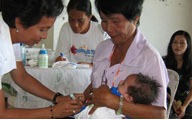
Increasing Access to Health Services
In the Autonomous Region of Muslim Mindanao (ARMM), in southern Philippines, less than half of pregnant women were receiving prenatal care or delivery assistance from a doctor, nurse or midwife. The infant mortality rate hovered around 41 percent and the under-5 mortality rate was 72 percent.
In this context, ACDI/VOCA helped implement the USAID-funded ARMM Health Project, or Sustainable Health Improvements through Empowerment and Local Development (SHIELD). This was a comprehensive maternal and child health project that focused on incorporating all sectors of society in promoting good health practices and better services. ACDI/VOCA worked in conjunction with Helen Keller International (HKI), which served as prime implementer on the project, to mobilize communities, health professionals and the government to improve health services delivery and coverage. The project focused its efforts on maternal, newborn and child health, family planning, tuberculosis, malaria, HIV/AIDS and avian influenza. ACDI/VOCA led these activities in two of the four targeted ARMM provinces, Maguindanao and Tawi Tawi, and headed two regionwide technical components—local government unit (LGU) support and communication for behavior change (CBC).
As part of the project’s primary activities, ACDI/VOCA conducted trainings and workshops for community members, health professionals and government officials. These included trainings in improved health practices; community organizing and outreach for community leaders; and communication skills and lobbying for stakeholders and health professionals to better advocate for improved health services and delivery. These trainings used a training-of-trainers methodology to increase the capacity of local experts to educate community organizations, health professionals, leaders and advocates long after the project has finished.
ACDI/VOCA also provided direct humanitarian assistance by supporting health campaigns such as the “Knock Out Measles” vaccination campaign and “Garantisadong Pambata,” an annual campaign that promoted breastfeeding and provided immunizations and vitamin A supplements to families.
The geography of ARMM posed some unique logistical problems. For example, Tawi Tawi is an isolated archipelago of 307 islands and islets; its inhabitants have little access to proper health care and reaching them is difficult. ACDI/VOCA addressed this challenge through the “Floating Clinic”—a boat equipped with an onboard health clinic that delivered health services and professionals to hard-to-reach islands.
To achieve long-term improved health services and delivery, SHIELD worked closely with regional and provincial governments, health boards and officials on official government health plans and policies. In the first year, the project facilitated the development of provincial investment plans for health in each province. In the second year, the project worked with regional government to establish a contraceptive self-reliance policy.
One of the most innovative and important components of SHIELD was the incorporation of religious leaders and culturally appropriate messages to encourage healthy living and counter stigmas against health practices such as family planning. This approach built upon the success of ACDI/VOCA’s Enhanced and Rapid Improvement of Community Health (EnRICH) project, the precursor to SHIELD. EnRICH facilitated the release by local Muslim leaders of three fatwa, or legal statements, that countered the common misconception that Islam is opposed to family planning. As part of SHIELD, ACDI/VOCA builds partnerships with local Muslim and traditional leaders throughout Maguindanao and Tawi Tawi. ACDI/VOCA conducted trainings on health, facilitated the leaders’ integration into community health activities, and provided them with the skills and knowledge needed to get local government to provide and fund better health services.





